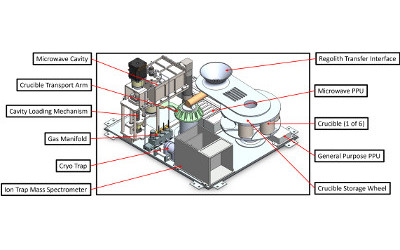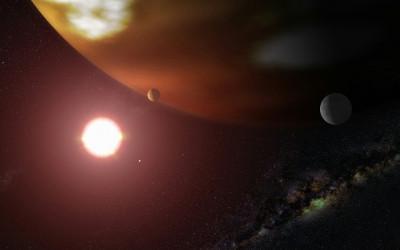New UK Space Agency funding brings Moon base one step closer

The UK Space Agency (UKSA) has awarded OU space researchers £200,000 to continue developing a one-of-a-kind construction method that could one day enable us to build on the Moon from lunar soil. Using the natural satellite's readily available resources as building materials would finally overcome the prohibitive and astronomical cost of transporting raw materials through space.
The process of microwave heating lunar soil is the brainchild of Dr Sungwoo Lim and his colleagues Professor Mahesh Anand, Dr Andrew Morse and Dr James Bowen, from The University's world-leading Space Instrumentation Group. The concept involves melting the Moon soils and then 3D printing to form solid construction components similar to concrete. To realise the process, Dr Lim and his team are developing a Microwave Heating Demonstrator (MHD) payload to travel to Moon's surface in a future mission.

The funding is the latest of five UKSA and European Space Agency (ESA) grants to develop the MHD concept since 2019. The researchers published early findings in peer-reviewed journals such as Nature Scientific Reports. Until recently, the researchers experimented solely under simulated conditions at the OU's Milton Keynes Campus. However, experiments on Earth cannot fully replicate challenging conditions on the Moon's low gravity, arid and abrasive surface. This latest funding follows £175,000 UKSA awarded to the OU and industrial partners, Added Value Solutions UK Ltd. and VIPER RF, in late 2022 to continue to develop a prototype instrument to go to the Moon as part of a future ESA mission.
Efficient, durable and consistent
Traditional microwave ovens create microwave energy using a magnetron vacuum tube to produce heat by agitating polar molecules of materials, such as water, in foods. In contrast, the OU researchers and their industrial partners will utilise a silicon transistor-based Solid-State microwave generator to develop a much smaller, lighter space-certified microwave generator subsystem for the MHD payload to go to the Moon. These solid-state microwave generators are typically used in wireless telecommunication networks and do the same job as a microwave but with better control, energy efficiency, durability and consistency. These qualities make them ideally suited for the hostile space environment.
The latest project phase has three primary objectives:
- Conduct experiments on lunar soil simulants to test microwave heating's efficiency in extracting oxygen.
- Build a prototype of the MHD payload to assess its performance and advance its critical mechanisms and systems.
- Generate a detailed Technology Readiness Level (TRL) assessment of the MHD payload components. TRLs are a method of estimating technology's maturity level to go into production. This step will enable the researchers to evaluate better when the MHD is ready to deploy.
Project lead, Dr Lim, said:
"The result will be a more precise and efficient microwave heating device that uses just 250 Watts to melt lunar soil compared to most microwave ovens' 1,000 Watts. This efficiency is essential to operate instruments on the Moon's surface, as available power through the lunar lander's battery and solar panel is limited to the mission payload requirement defined by the ESA or NASA."
The latest UKSA funding will also enable the researchers to test their microwave's ability to extract oxygen and water from lunar soil, paving the way for sustainable settlements on our nearest neighbour in space and further space exploration.
One small step closer to life on the Moon
"If this payload developed by our team is selected for future missions, it has the potential to provide valuable data that is not currently possible to obtain on Earth. Furthermore, this data will help researchers develop reliable technologies for lunar construction and resource extraction, which could ultimately contribute to advancing space exploration and realising long-held aspirations. It offers the tantalising possibility of creating all we need to sustain life and build a functioning lunar base using its natural resources, making the natural satellite a stepping-stone to space odyssey, missions to Mars and beyond the solar system," Lim continues.
The same technology could also tackle challenges back on Earth. Lim and his colleagues are already exploring the potential to apply these methods to cheaply and efficiently 3D print homes in developing countries, quickly construct shelters following natural disasters and build organically shaped frames to regrow damaged coral reefs underwater.
Contact our news team
For all out of hours enquiries, please telephone +44 (0)7901 515891
Contact detailsNews & articles

OU researchers lead international advances in planetary protection
Open University researchers are leading international advances in planetary protection, helping ensure that space exploration is safe, sustainable, and scientifically rigorous.